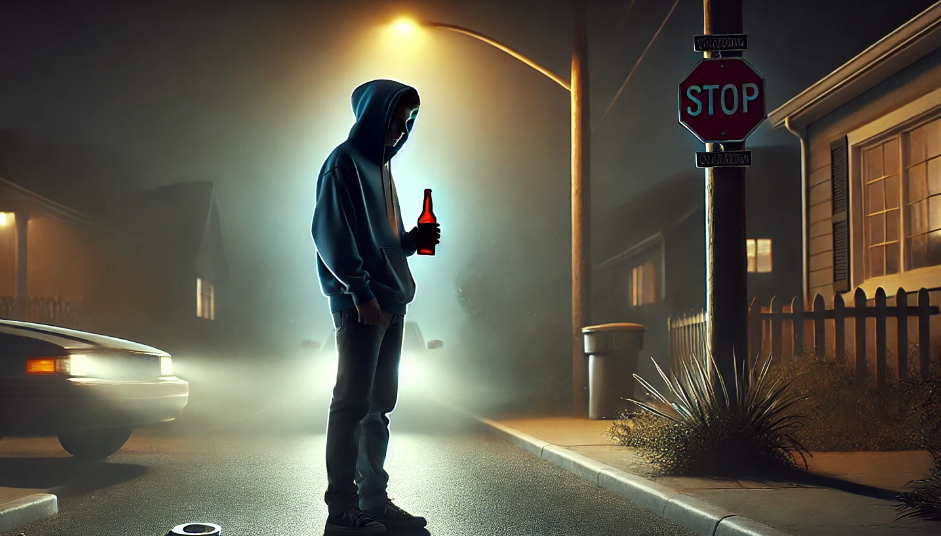How One Drink Can Lead to a Lifetime of Regret
It’s a scenario every parent and community fears: a teen says, “It’s just one drink, what’s the big deal?” – and that single choice triggers a cascade of consequences. Unfortunately, real stories abound of “first-time” or “one-time” drinking episodes that end in tragedy or lifelong regret. Underage drinking can have immediate consequences – accidents, legal trouble, health emergencies – that alter the course of a young person’s life. Even beyond the instant outcomes, starting to drink at a young age greatly increases the risk of long-term problems with alcohol. In short, one drink, especially if it happens at age 14 or 15, can set the stage for a lifetime of challengesniaaa.nih.gov.
When One Night Changes Everything
Consider the following composite story, drawn from real events that happen across the country: A 17-year-old attends a friend’s graduation party. He’s never drunk alcohol before, but gives in to peer pressure and downs “just one beer” to celebrate. On the drive home, that one beer – enough to impair his coordination and judgment – leads to a swerve off the road. He survives the crash, but his passenger (a close friend) is permanently injured. In an instant, he faces not only legal charges for DUI and underage drinking, but also the lifelong burden of having harmed someone he cares about. Sadly, versions of this story appear in news headlines every prom and graduation season. Even one drink can significantly impair a person’s motor skills and decision-making – meaning driving or any risky activity after “just one” puts everyone in dangerplpulse.com. There is no safe level of alcohol for teen drivers; reaction times slow and judgment falters even at low Blood Alcohol Concentration levels.
In other cases, the regret comes from narrowly avoiding disaster. Some teens have shared stories of getting so intoxicated their first time drinking that they blacked out or suffered alcohol poisoning. Waking up in a hospital bed with worried parents at your side – or not waking up at all – is a very steep price to pay for a night of “fun.” Underage drinkers are particularly prone to binge drinking (because they often drink quickly and in secret), which can turn one evening into a medical emergency. In 2011, nearly 188,000 under-21 individuals visited an emergency room due to alcohol-related injuriesniaaa.nih.gov, many of them first-time drinkers who simply didn’t know their limits or the danger.
Early Drinking and Lifelong Consequences
Beyond immediate incidents, research shows that the younger a person starts drinking, the greater their risk of developing alcohol use disorder (alcohol addiction) later in lifeniaaa.nih.gov. For example, adults who began drinking before age 15 are 3.6 times more likely to experience alcohol dependence or abuse than those who waited until 21 to drinkniaaa.nih.gov. One drink at 14 might not immediately ruin a life, but it can mark the beginning of a problematic relationship with alcohol. Many recovering alcoholics trace their struggles back to “that first drink” in middle or early high school, which opened the door to more frequent use. The teenage brain is still developing, and alcohol can hijack the brain’s reward system more powerfully at this age, increasing the odds of addiction.
Additionally, a single alcohol-related legal issue – such as an MIP (Minor in Possession) or a DUI – can have lasting repercussions. It might limit college options, derail scholarships (especially athletic or academic scholarships that require good conduct), or remain on one’s record into adulthood. A momentary lapse in judgment can result in a criminal record that requires explanation on college or job applications, a stigma that’s hard to shake.
Turning “Just One” into “Never Again”
Actionable Insight: The goal isn’t to scare teens but to ground them in reality: any underage drinking comes with risks that far outweigh the so-called reward. Parents and community members in Salmon can share age-appropriate real stories (from news or personal experience) with teens to illustrate these points. Emphasize that one wrong decision – even just one drink – can have irreversible consequences, and that no one is immune. It might be helpful to role-play scenarios: what will you do if offered a drink at a party? How will you get out of a situation where others are drinking? Having a plan can prevent that “one drink” from ever happening.
For those teens who have already had a close call or made a mistake, frame it as a learning opportunity: they got lucky, and now it’s time to make different choices. Mentors and counselors can help them understand that it’s never too late to choose a different path. Call to Action: This week, have a conversation with the young people in your life about the “what ifs.” Discuss a real story – perhaps from the news or a family you know – where underage drinking led to regret. Ask your teen how they feel hearing that story. Such discussions can be sobering (no pun intended) but ultimately empowering. By truly understanding the stakes, teens can make a promise to themselves: that “just one drink” isn’t worth a lifetime of regret, and they’d rather not take that gamble.
Sources: NIAAA, CDC, Personal Narratives (composite), NHTSA


Comments
Post a Comment